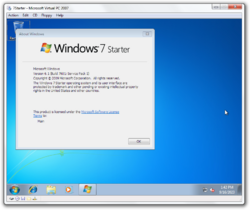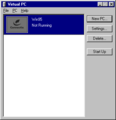Virtual PC
 Microsoft Virtual PC 2007 running Windows 7 SP1 (Starter SKU) | |
| Type | x86 hypervisor |
|---|---|
| Developer(s) | Microsoft Corporation |
| Host platform | Windows (x86) |
| Guest platform | 32-bit x86 |
| Latest release version | Virtual PC 2007 SP1 (6.0.210.0) |
| License | Proprietary, freeware |
Virtual PC is a PC-compatible virtualization platform by Microsoft. Originally developed by Connectix Corp as Connectix Virtual PC, it was acquired by Microsoft on 19 February 2003. The Mac version of Virtual PC is an x86 emulator compatible with PowerPC Macs, while the Windows version is a native x86 hypervisor utilizing dynamic recompilation and hardware-assisted virtualization. The latest version of Virtual PC supports up to Windows 7, but can additionally run on x64 editions of Windows 8 and Windows 8.1 with an unofficial patch, and x86 editions of Windows 10 without a patch.
The core platform technology from Virtual PC was later used in the development of a cut-down version known as Windows Virtual PC, mainly intended for use with Windows 7's Windows XP Mode. It was installed as an optional update package found on Microsoft's website, unlike its predecessors which were installed via an installer. It was succeeded by Hyper-V.
History[edit | edit source]
Under Connectix[edit | edit source]
Connectix Virtual PC[edit | edit source]
Connectix Virtual PC is a PC-compatible x86 emulator targeting the Intel Pentium, including emulated features such as MMX, FPU, MMU, and Protected Mode. Virtual PC 1.0 supports PowerPC Macs running Mac OS 7.5.5 and comes pre-installed with a choice of either Windows 3.1 or Windows 95. A later version was also bundled with PC-DOS. Additional operating systems can be purchased separately for use with Virtual PC, such as Windows NT, OS/2, and OPENSTEP.
Virtual PC 2.0 adds support for DirectX and UXGA resolutions as part of an emulated S3 Trio card.
Virtual PC 3.0 supports Mac OS 8.0 and comes bundled with Windows 98 while supporting existing Windows 95 installations.
Virtual PC 4.0 supports Mac OS 8.6 on a PowerPC G3 processor or higher, but certain features require Mac OS 9. It adds support for dynamic disks (up to 127GB) and comes bundled with Windows 98 SE or Windows ME.
Virtual PC 5.0 is the last version from Connectix, supporting both Mac OS 9.1 and Mac OS X. It comes bundled with a choice of Windows XP, Windows 2000, Windows 98 SE, or PC-DOS.
Connectix Virtual PC for Windows[edit | edit source]
Virtual PC 4.0 is the first version of Virtual PC to support Windows. It runs x86 user mode instructions natively, and dynamically recompiles kernel and real mode instructions as necessary. It supports Windows ME, 2000, and NT 4.0 as host operating systems.
Virtual PC 5.0 drops support for Windows ME as a host operating system, opting to support only Windows XP, 2000, or NT 4.0.
Connectix Virtual PC for OS/2[edit | edit source]
A port of Virtual PC to OS/2 was made in 2002 by InnoTek (who would later develop VirtualBox). Versions 4.2, 4.3.2, 5.0 and 5.1 of this port were released, which supports OS/2 Warp 4 (officially 4.51) or higher as a host operating system.
Under Microsoft[edit | edit source]
Virtual PC for Mac[edit | edit source]
Virtual PC 6 is the first version of Virtual PC published by Microsoft, supporting only Mac OS X. It comes bundled with Windows XP, 2000, or 98 SE, but is also available as a upgrade-only edition.
Virtual PC 7 is the last supported Mac version, as it was never updated to support Intel-based Macs.
Virtual PC for Windows[edit | edit source]
Virtual PC 2004 is the first version available free of charge from Microsoft.
Virtual PC 2007 adds support for hardware-assisted virtualization, including AMD-V and Intel VT-x. Additionally, it supports multiple monitors and Windows Vista as a guest (with limitations). Windows 7 is also available as a guest unofficially, although the Service Pack 1 update must be installed.
Supported guest operating systems[edit | edit source]
A list of officially supported OSes that can run on Virtual PC.
- MS-DOS and compatible operating systems
- Microsoft Windows versions up to Windows 7/Windows Server 2008 R2
- OS/2 (OS/2 1.0 to 1.30.1 however requires patching in order to run)
Gallery[edit | edit source]
Virtual PC 3.0 running Windows NT 3.51
Ditto, running Windows NT 4.0
Virtual PC 4.1 running Windows 95 with Microsoft Plus! installed
Virtual PC 5.2 running Windows 98 with Microsoft Plus! installed
Virtual PC 6 running Windows 98 SE
Virtual PC 2004 booting Windows 98 build 1559
Windows 2000 running in Virtual PC 2007
External links[edit | edit source]
Microsoft Acquires Connectix Virtual Machine Technology, Microsoft Source. 19 February 2003.
















